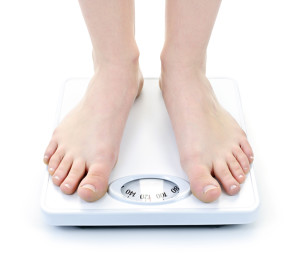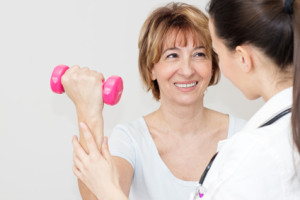My clients commonly ask me What should I weigh? — as if I had a crystal ball. Although I could look at weight charts, I find charts to often be misleading; each athlete’s body is unique. I prefer to suggest an appropriate weight range for a person based on a conversation with them, not by looking at a chart. Yet, many athletes pick a number that sounds good for their ideal weight. Sound familiar?
Achieving an arbitrary number can be a relentless task, particularly if you are in a sport that focuses on leanness, such as running, light-weight rowing, cycling, etc.. While “lighter is better” is true to a certain extent, you want to take into account:
1) your genetics; the apple doesn’t fall too far from the tree.
 2) the fact that the bathroom scale weighs both muscle and fat.
2) the fact that the bathroom scale weighs both muscle and fat.
3) your quality of life (very low if you are trying to attain a weight that requires relentless white-knuckling of hunger).
I frequently help my clients figure out what a good weight is for them. If you have a similar concern, here are my answers to weight-related questions my clients commonly ask me.
Q: I am “obese” according to the BMI charts. My doctor tells me to lose 20 pounds. I am muscular; I lift heavy weights! I don’t think I have 20 pounds of fat to lose. Do you???
A: Body Mass Index (BMI) does not reflect body fatness. You can have a high BMI with low body fat. BMI simply is a ratio of body weight adjusted for height. (BMI = weight in pounds/(height in inches x height in inches) x 703). Given that muscular athletes have more mass (and also heavier bones) than scrawny people, many athletes get classified as “obese” by the BMI charts. Don’t worry!
Q: My weight fluctuates a lot — from 122 pounds in the morning to 127 pounds in the afternoon. Is that normal?
A: Yes, you can easily gain 5 pounds during a day — but it’s not 5 pounds of fat. It’s 5 pounds of water and food. Just drinking a 16-ounce bottle of plain water will contribute to one pound of weight-gain on the scale. That’s because your stomach is like a balloon: light when filled with air, heavy when filled with water. Hence, the only time to weigh yourself to get a true weight is first thing in the morning, after you have gone to the bathroom and before you eat or drink anything. Not at the end of the day.
If you compulsively weigh yourself two or three times a day, give it up! You won’t benefit from driving yourself crazy by seeing your weight go higher and higher during the day. You might want to hide the scale in the trunk of your car, and use it only once a week, if at all. Your better bet is to judge weight changes by how you feel, if your clothes are looser, and if you see less fat in the mirror.
Q: People tell me I look great, but I don’t believe them. I think they are just being kind. How can I know if my weight is OK?
A: Maybe you want to get your body fat measured? That would give you an indication of how much excess fat you have, if any. Alternatively, you could ask a trusted friend if you should try to lose more weight. You might be surprised to learn you actually do look great, believe it or not. While the possibility exists that person is lying, the possibility also exists that person is telling the truth. Ask a few more people to get their opinions. Majority rules.
When trying to figure out if you are too fat, please pay attention to your genetics. Humans, like dogs, come in differing sizes and shapes. Just as the dog kingdom includes St. Bernards, greyhounds and bulldogs, the human kingdom includes people from Kenya, Ireland and Mexico, all of whom have genetically different physiques and levels of body fatness. Maybe you are like a St. Bernard: strong and powerful — and a great athlete.
Q: I’ve lost 40 pounds and I’d like to lose another 10 pounds but I have hit a plateau. I’m so frustrated…
A: Plateaus are indeed frustrating for dieters who can’t quite get to their fighting weight. Those last few pounds can be tough to shed. Research suggests dieters do not hit a plateau due to metabolic issues. Rather, they find it hard to sustain a lower and lower calorie intake. That is, a lighter body requires fewer calories. Eating less and less is not much fun, is it? If you are battling a weight-loss plateau, these suggestions might be helpful:
— Assess if you really do have more fat to lose. Maybe what you see as “fat” is actually “flesh” (with empty fat cells)? This is particularly true for reduced-obese people who have lost 100 pounds or so and they have a lot of skin flapping around their mid-section.
— Pay attention to how much you are actually eating. Baby carrots can be a healthy snack for dieters, but carrots are not “free.” If you eat the whole 16-ounce bag of carrots, you are eating 175 calories. Even “healthy foods” have calories that add up and need to be counted.
 — Perhaps you have become a “sedentary athlete.” That is, after you fervently exercise for an hour each morning, do you then sit for the rest of the day? One hour of exercise does not compensate for a day dominated by sedentary behavior. Maybe an exercise tracker or a step counter could inspire you to move more during the entire day?
— Perhaps you have become a “sedentary athlete.” That is, after you fervently exercise for an hour each morning, do you then sit for the rest of the day? One hour of exercise does not compensate for a day dominated by sedentary behavior. Maybe an exercise tracker or a step counter could inspire you to move more during the entire day?
— Perhaps you could start lifting weights (if you do not already do so) to build muscle. Muscle is an active tissue that burns calories. The more muscle you have, the more food you can eat. By restoring muscle lost while dieting, you become stronger — and boost your calorie burn.
Words of Wisdom: If you need help determining an appropriate weight for your body, get an unbiased opinion from a registered dietitian (RD). To find a local sports RD, use the referral network at SCANdpg.org. And please, be grateful for your body, even if it is heavier than you might choose.
Sports nutritionist Nancy Clark, MS RD CSSD, has a private practice in the Boston-area (Newton; 617-795-1875). She teaches both fitness exercisers and competitive athletes how to eat to perform well. Her best-selling Sports Nutrition Guidebook, and food guides for marathoners, cyclists and soccer players, as well as her teaching materials, are available at nancyclarkrd.com. For online and live workshops, visit NutritionSportsExerciseCEUs.com.
